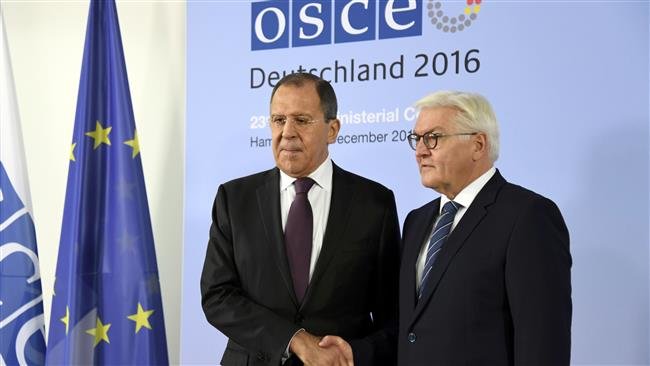
Sergei Lavrov talte ved en konference, torsdag i Hamburg for Organisationen for Sikkerhed og Samarbejde i Europa (OSCE).
Han tilskyndede alle OSCE nationer om at tage "et kort af kontinentet og sammen hvad der er hvor og hvad der tilhører hvem," refererende til NATOs udvidelse mod Rusland.
Moskva ser NATOs udvidelse i det østlige Europa siden den kolde krig som en trusselm mod dets sikkerhed.
Kommentar: Denne artikel er delvis oversat til dansk af sott.net fra: West using 'Russia threat' as pretext to destabilize Europe: Lavrov
"We are sure such a review will convincingly dismantle the myth of a Russian threat and demonstrate where the real risks are coming from," Lavrov argued at the OSCE nations foreign ministers' annual meeting.
"The euphoria the West was in after the end of the Cold War didn't lead to an architecture of security for all in the Euro-Atlantic space," he said, adding that, instead, "the choice was made for a closed NATO-centered system."
Lavrov then reiterated that Western military policies in the Middle East and North Africa had also caused destabilization and conflict in those regions, triggering the unprecedented influx of refugee into the European continent.
"An honest conversation must be held about the causes of the migrant crisis in Europe that are the result of gross interference in the internal affairs of countries in the Middle East and North Africa leading to chaos, terrorism," he said.
On the conflict in eastern Ukraine, Lavrov slammed Kiev for stalling the internationally-mediated peace efforts by refusing to hold direct talks with the pro-Moscow forces demanding greater autonomy in the Russian-speaking regions.
At the same meeting, Ukrainian Foreign Minister Pavlo Klimkin claimed "Russian aggression" had caused the conflict in eastern Ukraine and called for the deployment of OSCE forces to restore peace in the restive region.
"The stakes are bigger and the price is higher than ever, the death toll from the war of Russia against Ukraine has already risen to 10,000," he said.
Germany, which chaired the conference, highlighted the deteriorating security situation in Europe.
"The pillars of the OSCE are crumbling, the tone is getting harsher between East and West," said German Foreign Minister Frank-Walter Steinmeier.
The top German diplomat urged all sides to make a joint effort to find "common answers to the new global challenges of terrorism, extremism and cyber attacks."
Steinmeier emphasized that in order to resolve the disputes, the first and utmost step was the "need to rebuild trust where it has been lost."
The OSCE (known as CSCE before 1995) has 68 members (57 participating and 11 cooperative) and was created during the Cold War to promote East-West relations.



Læserkommentarer
dig vores Nyhedsbrev